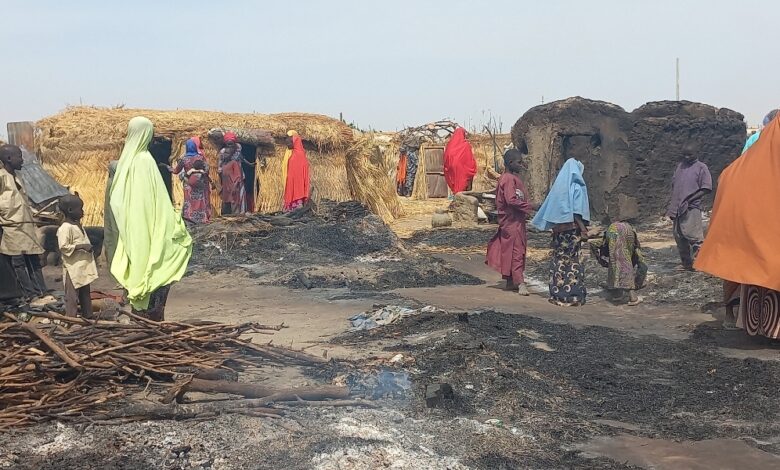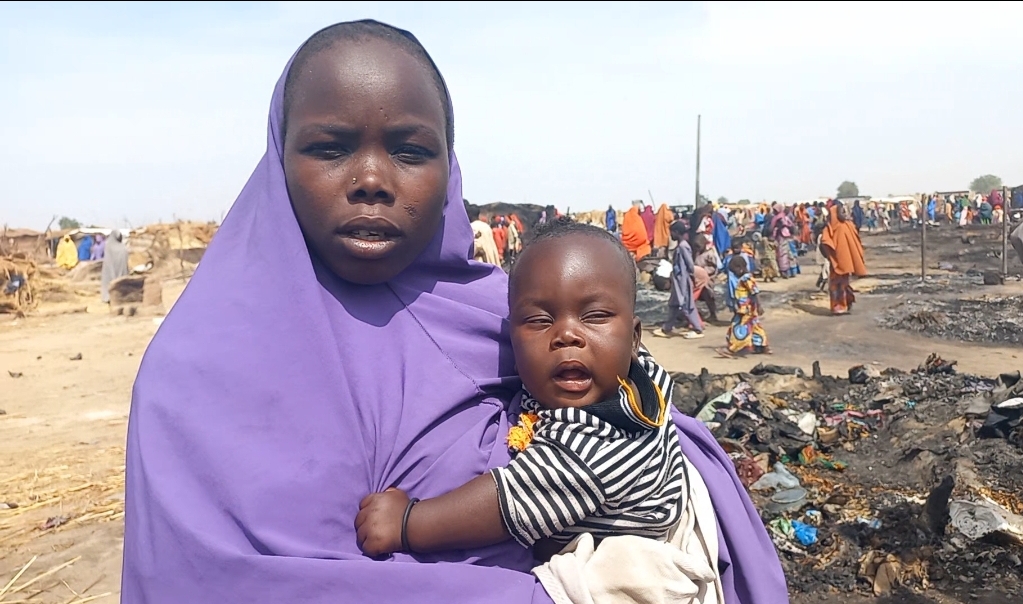Fires Cost Displaced People “Illicit” Election Cash
Several fires have taken a toll on the lives of displaced people living in fragile houses around Maiduguri, Northeast Nigeria. Many have to live with the attendant losses, but losing their voter’s cards just days to an election represents a double loss.

People who lost their homes in a fire that gutted Muna camp for internally displaced people in Maiduguri, Borno state, northeast Nigeria, will also lose their vote as their voters’ cards went up in the flames.
While some were rueing the loss of their democratic mandate, others told HumAngle they were disappointed they will not be able to get the money that some parties are offering for selling their Permanent Voters Card when the election comes around.
Barely a week after as many as 200 thatched homes were razed during a fire at Muna Alamdari camp, another incident occurred on Tuesday, Feb.14, in the same facility, leaving dozens of homes burned to the ground.
Yaana Mommodu, still nursing a child, said her PVC was burnt in the fire.
“When I rushed back to the camp, everything was covered with smoke, and I could not even locate where our house used to be until a neighbour showed me a burnt spot saying that was our home. Everything was burnt to ash,” she said.
Yaana said her prayers were to find her PVC. But all her effort to find it beneath the hot ashes as she scavenged with a long stick was futile. It was a double edge loss to her.
“Now I have lost the chance to vote, and also a ticket to get money on the election day,” she said.
Fires
Though the repeated fires at the camp cause the residents to lose their personal effects, the recent conflagrations have done more damage than ever.

Abba Wakil, a local security personnel at Muna Camp, informed HumAngle that most victims had lost their Permanent Voters Cards in the fire.
“This has been a major setback for those affected because they have suffered for many days to get their PVCs,” Wakil said.
One of the survivors, who identifies herself as Maimuna, confirmed that both her and her mother’s voters’ card got burnt in the fire incident last week.
“We were unable to retrieve any of our belongings when the fire started, and it continued to burn until everything was burnt entirely,” she said.
Maimuna explained that the women suffered the worst loss because “unlike the men, we normally keep our valuables at home.”
“My mother and I kept our PVCs inside a bag in our room, but everything has gone now -we lost them,” she said.
Illicit norm
It has been an illicit norm for voters, especially the uneducated ones to expect some monetary inducement from politicians on polling days. And most IDPs look forward to such days when they can use their PVCs to get some cash as a reward for voting for specific candidates.
“Many of us women whose houses were affected have lost their PVCs, and it hurts because we suffered to get the PVC,” said Yaana.
Yagana Musa, a mother of three children, said her PVC also got burnt in the fire that razed her home last year.
“I went to vote in my village Mafa during the last election, but I won’t be doing that now because my voter card was burnt in the fire outbreak of last year,” she said.
Yagana, in her mid-20s, said she thought the electoral officials would issue another card to her on Election Day but was told that may not be possible.
“It is not my luck that I’ll vote this time, so I wish others who have their cards good luck.”
Hundreds disenfranchised
It is assumed that hundreds of IDPs may have lost their PVCs to fire incidents in IDP camps between 2019, when they last voted, and today.
Humangle can report that as many as 40 incidences of fire outbreaks have occurred since 2019 to date. And in these declared fire disasters, IDPs who survive have lost all they possess.
In 2019, shortly after the general elections, at least three incidents or fire outbreaks were reported between February and April of that year.
On Mar. 12, 2020, a major fire incident was reported at Waterboard IDP Camp in Monguno town of Borno state, Northeast Nigeria, which was followed by yet another disaster that occurred a week after (Mar. 20, 2020)
The two incidents left 248 individuals from 48 households losing all of their belongings and personal effects.
On Apr.16, 2020, another major fire incident occurred at the International Secondary School camp, Ngala, central Borno, which destroyed hundreds of households with at least 14 deaths and 15 injuries recorded.
Between 2021 and 2022, at least 11 fire incidents have been reported in IDP camps in Maiduguri, Monguno, and Mafa local government areas of Borno State alone.
During the period in focus, about 20,120 shelters were destroyed in fire disasters affecting 53,040 individuals who had lost their homes and valuables – some including their PVCs.
The Independent National Electoral Commission (INEC) ended the issuance of PVCs to registered voters on Sunday, Feb.6, 2023, which foreclosed the chances of the IDPs whose PVCs were destroyed in fire incidents getting a replacement.
Support Our Journalism
There are millions of ordinary people affected by conflict in Africa whose stories are missing in the mainstream media. HumAngle is determined to tell those challenging and under-reported stories, hoping that the people impacted by these conflicts will find the safety and security they deserve.
To ensure that we continue to provide public service coverage, we have a small favour to ask you. We want you to be part of our journalistic endeavour by contributing a token to us.
Your donation will further promote a robust, free, and independent media.
Donate HereStay Closer To The Stories That Matter




